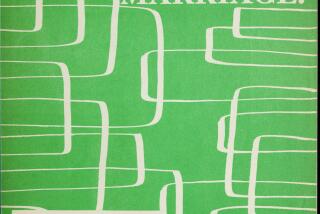He’s In at Out
- Share via
Out magazine, the nation’s largest gay and lesbian magazine, is bracing itself for a British invasion.
New Editor in Chief James Collard is another in a long line of British editors finding work on our shores. The 34-year-old former editor of the English gay magazine Attitude joins Tina Brown at the New Yorker, Anna Wintour of Vogue, John O’Sullivan of National Review and Liz Tilberis of Harper’s Bazaar.
His recent appointment also follows a turbulent spell at the publication, which saw one editor leave in 1996 and the last, Sarah Pettit, exiting last fall. According to the Village Voice, Out’s President Henry Scott had reservations about the tone Pettit set for the magazine (he wanted it lightened up) and her management style (considered too brusque by some). Still under discussion is Out’s audience--should it cater to gay men, gay women, or both?
Collard says he already has a vision for the New York-based magazine (founded in 1992, now with a circulation of 133,000) focusing on politics, causes of national interest and a good dose of humor.
“I think the thing a magazine like Out should be doing, as well as saying ‘Here are 10 belts under $100,’ is, ‘How do I come out at work?’ Really speaking to people’s lives. If someone is in an abusive relationship, what is the best way out of it? Giving information about drug use, which is by no means a stranger to the gay community. Just informing people, enabling them to make wise choices.”
Speaking from London, Collard adds, “Personally, I’m probably more political than I am an activist. As a gay man, there are issues I care about very much, such as I think there needs to be some mechanism where nonmarital relationships have some kind of protection under the law. I think the magazine has a very powerful voice, one which can be used very well.”
Collard, who has also contributed to the Guardian, Time Out, the Independent and the Sunday Times (of London), hopes to alienate no readers as he has his go at Out. Stories, he said, will appeal to gay men, gay women and even the straight population.
“It’s not like we’re forgetting what our readers need,” he explains, “but a gay man doesn’t necessarily just want to see a gay art house movie. I’m not saying I want to leave behind the gay readership--that’s our bread and butter--but I also want to please people by giving them something world-class, something beyond the gay ghetto.”
He adds: “I think no editor in his right mind turns anybody away. There are obviously shared political goals, and very often shared experiences, like gay adoption, are human things. There’s more connecting us than dividing us.”
Another thing he feels gay men and women share is “a really powerful, sharp and quite often vicious sense of humor. It can be an effective weapon, since there are two ways of reacting to somebody having a go at you; one is to get angry, and the other is just to flip back a camp remark. What more effective way of undermining the opposition is there than to mock them? There could be more of that in the magazine.”
And lest Americans worry that a foreigner is at a distinct disadvantage heading a U.S. magazine, Collard sees it differently: “If there is any common theme among the British editors in New York, it’s that you’re coming to things with a different approach. It’s like you’re completely gob-smacked by things, like the size of the buildings. The differences really, really throw you. As a child I grew up watching images of America, the thrill of it, the glamour of it. I walk around New York smiling like an idiot. It’s exactly like being in love.”
‘If there is any common theme among the British editors in New York, it’s that you’re coming to things with a different approach.’


